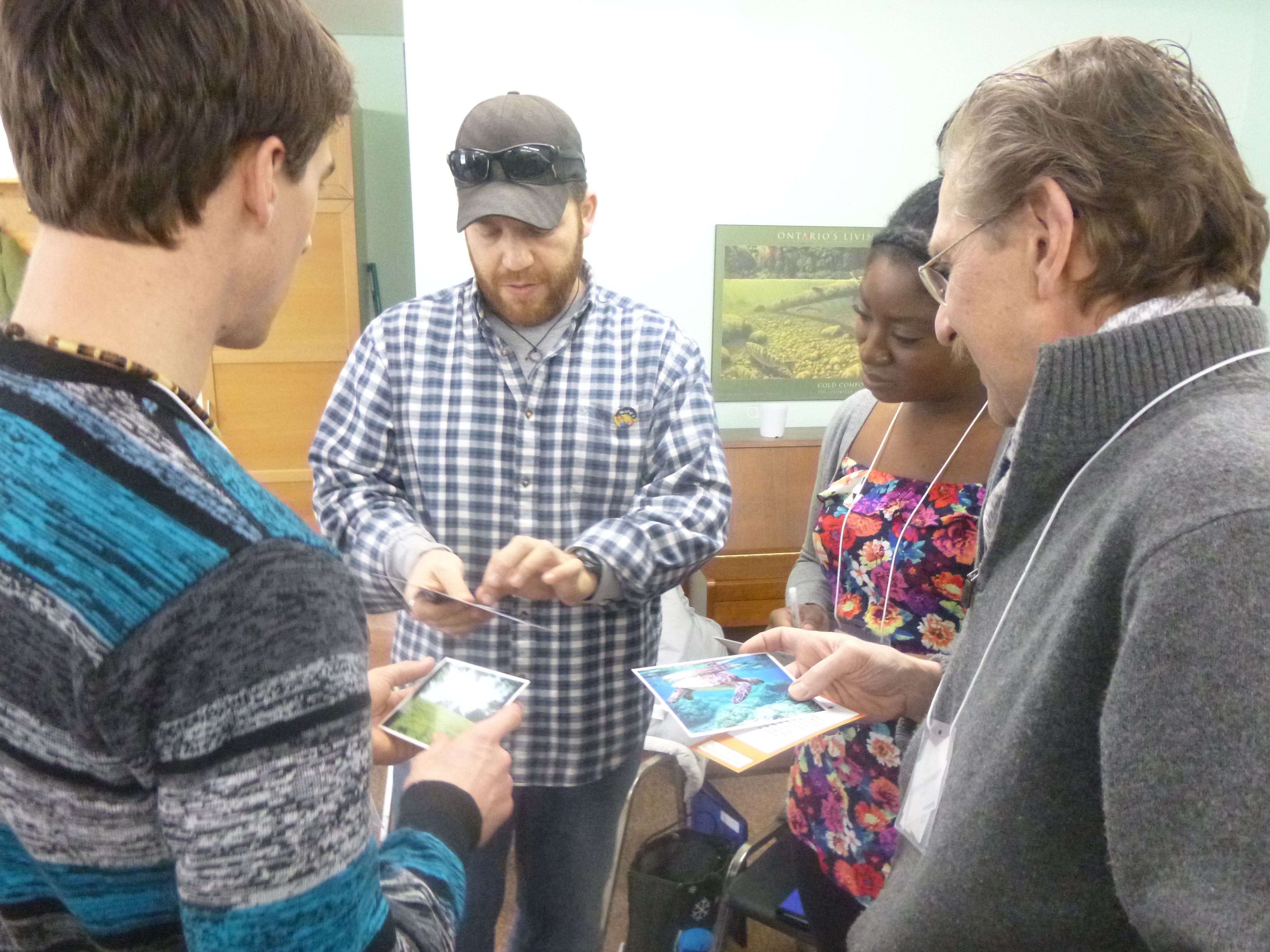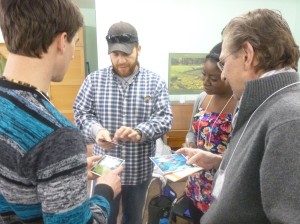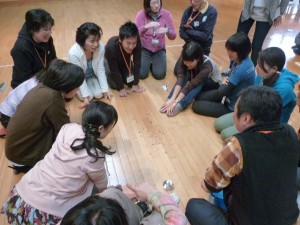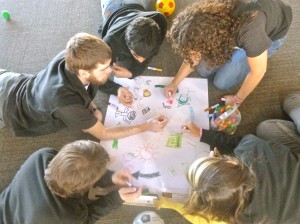
Dec 16, 2013 The Value of Reflection
Reflection brings learning to life. Reflective practice helps learners find relevancy and meaning in a lesson and make connections between educational experiences and real life situations. It increases insight, and creates pathways to future learning. Reflection is called by many different names in the education field including processing, reviewing, and debriefing. I personally have moved towards referring to this key ingredient in teaching and group facilitation as reflection or reflective practice.
 In my view, reflection is the most important ingredient in teaching and learning. To continue with the cooking metaphor for teaching and facilitation offered in past issues of this blog, it is the “egg” that binds ingredients together and helps them rise. In cooking, eggs provide structure, richness, color, and flavor to recipes. Similarly, reflective practice creates context for learning and makes lessons “stick” by helping learners pull meaning from a learning experience and find relevancy in a lesson. Reflection brings out the “flavor” of the lesson and creates structure and depth of understanding. Reflective practice helps learners “rise” to future situations by cultivating the ability to apply information to real life and future learning.
In my view, reflection is the most important ingredient in teaching and learning. To continue with the cooking metaphor for teaching and facilitation offered in past issues of this blog, it is the “egg” that binds ingredients together and helps them rise. In cooking, eggs provide structure, richness, color, and flavor to recipes. Similarly, reflective practice creates context for learning and makes lessons “stick” by helping learners pull meaning from a learning experience and find relevancy in a lesson. Reflection brings out the “flavor” of the lesson and creates structure and depth of understanding. Reflective practice helps learners “rise” to future situations by cultivating the ability to apply information to real life and future learning.
 Processing or reflection helps learners make connections from the skills they use and practice in the classroom, or in team-building, training or therapeutic group sessions to other day-to-day life situations and future learning experiences. It enhances their ability to apply skills learned to issues such as resolving conflict with their peers, co-workers or family, dealing with frustration, expressing their opinions appropriately, managing stress, and setting goals and priorities.
Processing or reflection helps learners make connections from the skills they use and practice in the classroom, or in team-building, training or therapeutic group sessions to other day-to-day life situations and future learning experiences. It enhances their ability to apply skills learned to issues such as resolving conflict with their peers, co-workers or family, dealing with frustration, expressing their opinions appropriately, managing stress, and setting goals and priorities.
Reflective practice creates ownership over learning by allowing people to internalize a lesson. This enhances the ability for participants to grow and change through their experiences and develop insight, one of the most important life long skills to acquire. When we engage learners in ongoing reflection in our programs and courses we not only help them retain and apply or “transfer” lessons learned to other applications, we promote their readiness to become more reflective, introspective learners in the future. Reflective practice strengthens participants’ ability to learn on their own to be more reflective in their day to day experiences. This kind of introspective ability helps them recognize their strengths, manage their behaviors, and learn to apply skills and insights learned in one situation to the next one.
 Traditionally many educators think of reflection as a “follow-up” to an experience and use the term “debrief” to describe this post experience wrap up. I encourage educators to instead view reflection as ongoing engaging “practice” that we begin with our groups from the moment they walk in the door (or maybe even before with pre-group journaling or questionnaires). Meaningful reflection is something that can and should be woven throughout the entire experience through a variety of methods including the use of art, movement, play, metaphoric objects and images, as well as dialogue.
Traditionally many educators think of reflection as a “follow-up” to an experience and use the term “debrief” to describe this post experience wrap up. I encourage educators to instead view reflection as ongoing engaging “practice” that we begin with our groups from the moment they walk in the door (or maybe even before with pre-group journaling or questionnaires). Meaningful reflection is something that can and should be woven throughout the entire experience through a variety of methods including the use of art, movement, play, metaphoric objects and images, as well as dialogue.
A century ago John Dewey emphasized the importance of engaging learners in reflection in order to help learners make connections with the lesson or learning experience and real life and future learning. He believed that our experiences shape us. When reflective practice is part of the learning it creates meaning and relevancy from these experiences and initiates further growth and change. Reflection has become a key tenet of experiential education philosophy.
The modern day field of educational neuroscience reinforces Dewey’s view by showing us that we are indeed shaped by our experiences and continue to be throughout our lives. Educational neuroscientists also emphasize that intentional engagement in reflective practice is key to “cementing” learning. Reflection creates multiple pathways to learning, facilitates “patterning” and meaning making. Well facilitated reflection provides a forum for learners to give and receive feedback and enhances application, transfer, retention and recall. In my next post I will explore these concepts from the field of educational neuroscience that support the value of facilitating intentional time for reflection in education and group work.
Reference:
Dewey, John. (1938) Experience and Education. New York: Macmillan Publishing Co.
Dewey, J. (1933). How We Think: A Restatement of the Relation of Reflective Thinking to the Educative Process. Boston: D.C. Heath.



Herni Halim
Posted at 18:22h, 13 March“Reflection enhances the ability for participants to grow and change through their experiences and develop insight, one of the most important life long skills to acquire”. I agree with this statement as reflection helps the students to participate actively in the class (not being passive by just listening to the teacher or lecturer in front of the classroom) and allow them to relate the lesson learned in class to the reality outside the class . I just started using simple reflection in my class by asking the student to reflect’ what is one thing that they learned in class for today’s lesson” in padlet.com. Based on the responses, I generally know that the students learn something in my class. The article on ‘The Value of Reflection’ makes me realize that reflection is the key to experiential education and experiences shape us of what kind of person we will be in the future. Therefore, I will do more meaningful reflection with the students in the class.
Herni Halim
Posted at 18:27h, 13 MarchI agree that reflection enhances the ability for participants to grow and change through their experiences as reflection helps the students to participate actively in the class. The article on ‘The Value of Reflection’ makes me realize that reflection is the key to experiential education and experiences shape us of what kind of person we will be in the future. Therefore, I will do more meaningful reflection with the students in the class.
Muniswaran Sivanathan
Posted at 01:46h, 14 MarchInternalization invites learner into a personalized learning experience. When a learner reflects on what one expects, experiences and completes a learning activity, the period of “before”, “during” and “after” learning activity not only could potentially mark a knowledge gap between one another, but possibly a growth of knowledge which the learner can relate personally after internalizing the learning experience on top of existing and related personal understanding and experience. The process of reflection takes the learner close to the knowledge, builds on what one has already know and expands it.
From this text, I realized that reflection is actually a never ending process. Reflection does not only occur in the classroom but outside as well. As our lives are shaped by our experiences, it is vital for us to never stop reflecting in whatever we do. This is because through reflecting, it is the only way to know of our performances in a particular task and learn more about ourselves.
I also realized that ongoing reflection practices will help people to become better learners in the future and this will contribute to what Dewey (1933) calls “future learning”. And the only way to do this is by helping learners make correlations between what they are learning in the classroom and what